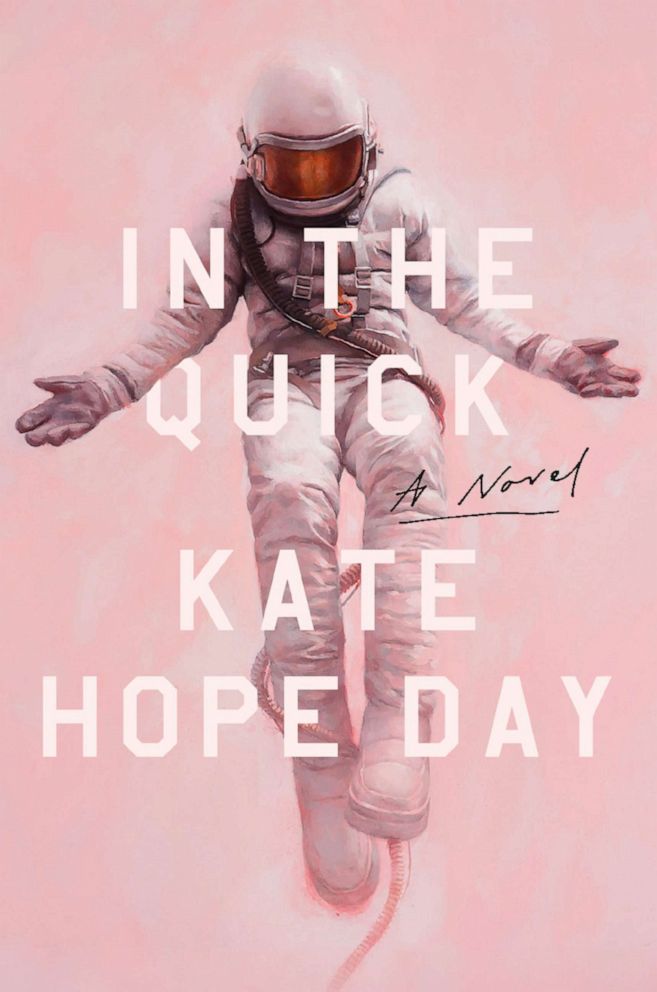'GMA' Buzz Picks: 'In the Quick' by Kate Hope Day
Here's what else the "GMA Book Club" is reading this month.

If you've finished our "GMA" Book Club pick this month and are craving something else to read, look no further than our new digital series, "GMA" Buzz Picks. Each week, we'll feature a new novel that we're also reading this month to give our audience even more literary adventures. Get started with our latest pick below!
This week's "GMA" Buzz Pick is "In the Quick" by Kate Hope Day.
Day's second novel follows June, a brilliant and precocious girl, who leaves home to begin a grueling astronaut training program. While she's younger than many in her class, she flourishes and six years later becomes an engineer on a space station.

However, while on the job, she's haunted by a revolutionary spacecraft called "Inquiry," which went missing when June was only 12 years old. The spacecraft was powered by her late uncle's fuel cells. The rest of the world has forgotten about the space crew, but when June gathers evidence that makes her believe the crew is still alive, she seeks out her uncle's former protégée, James, who has also been trying to figure out why "Inquiry" failed.
Part mystery and part love story, Day's novel is a story about one woman's persistence and journey to self discovery and also an exploration of the strengths and limits of human ability in the face of hardship.
Read an excerpt of "In the Quick" below and listen along to the excerpt read by Rebecca Lowman.
Read along with us and join the conversation all month long on our Instagram account -- GMA Book Club and #GMABookClub

*****
Space is cruel to the human body. We aren't machines, rockets with metal skin and polymer bones, rovers with microchips for guts. Our bodies are full of fluid and soft tissue. We aren't built for space. Our thoughts, the things we know, are sturdier in zero gravity, but they originate in gray matter. They change shape, even disappear in the face of disorientation, dehydration, oxygen deprivation. Because ideas require bodies too, hands, lips, a tongue, ears. Otherwise they're about as useful as dust motes drifting in the air.
When I was twelve years old and watched test rockets spark through the sky outside my aunt Regina's house, I imagined their destinations—perfectly round planets colored red and pink and white. I pictured spacesuits, puffy and bright against a black expanse. It didn't occur to me to think about the bodies inside those suits, the brains inside those helmets.
Not until a frozen day in November when the news came that the Inquiry explorer was in trouble. It was on a six-year mission, the first of its kind, to travel farther in our solar system than any manned mission had gone before. Inquiry was special; more than a decade of research at the National Space Program had gone into building the explorer, and it was manned by four of the most talented astronauts in the world.
It was a Saturday, late morning. I sat in the window seat in the living room with a book on my lap: New History of Energy. A chapter was devoted to my uncle and his famous fuel cell. The book smelled like him—like metal shavings and pen ink. Since he'd died I'd read the chapter at least twenty times.
I turned a page. Outside, rockets launched from the NSP campus lit up the hard gray sky. The sound of the TV came from the living room; a man was talking about Inquiry. I went into the hallway to listen and my limbs went cold. The explorer had lost all propulsion control just as it was beginning its orbit around Saturn.
The newscaster lowered his voice and began talking about the minutes leading up to when the explorer lost power. He said its fuel cells were suspected. But that couldn't be right because my uncle had invented those cells. I moved closer, my stomach a heavy weight. He didn't say anything more about the cells. Instead he talked about the Inquiry crew, and I grew impatient because I already knew everything about them, where they grew up, how old they were, what they had studied in school. If they had siblings and how many. Their hobbies and what they liked to read—I could tell you every detail.
The newscaster began reading from a statement issued from NSP. They were in constant communication with Inquiry, it said, and were working around the clock to troubleshoot the suspected fuel cell malfunction. Inquiry had recently received an unmanned supply capsule, the second of twelve scheduled to reach it at six-month intervals, and had ample food and water and an open line of communication with Earth. NSP was confident a solution was imminent. The crew were not in any immediate danger and had been in contact with their families. Then the man stopped talking about Inquiry and the weather report came on.
I returned to my spot in the window and called the dogs, Reacher and Duster, to come sit with me, but neither came. I felt chilled and stiff, and pulled my sweater to my chin. The words in New History of Energy swam on the page. I got up, went into the kitchen, and opened the closet door.
Inside was my aunt's new vacuum, a sleek silver machine with a nozzle like a two-headed snake. I used a knife to disconnect the nozzle, take out the screws, and remove the plates and filters. When I lifted the motor's cover the smell of dust and paper filled my nose. The fan inside was a perfect plastic flower, with curved gray petals and a small red center that made a soft clicking sound when I turned it with my finger. Clockwise, and then counterclockwise. I imagined that when the flower moved forward I was turning time, that night was falling around me. Everyone was asleep and there was no rush. I could look at all the parts of the vacuum and think about how they could be put together differently, combined with other things and made into something new.
I imagined that when the flower moved backward time reversed, to before the news about Inquiry. To before my uncle died, when he held me in his lap as he typed on his computer or pored over sheets of paper with faint blue pictures on them. I tried to imagine before that, further back than I could actually remember, to before I came to live with my aunt and uncle. Back to when my parents were alive, but the flower didn't go that far.
*****
Excerpted from IN THE QUICK by Kate Hope Day. Copyright 2021 by Kate Hope Day. Excerpted by permission of Random House, an imprint of Penguin Random House. All rights reserved. No part of this excerpt may be reproduced or reprinted without permission in writing from the publisher.






